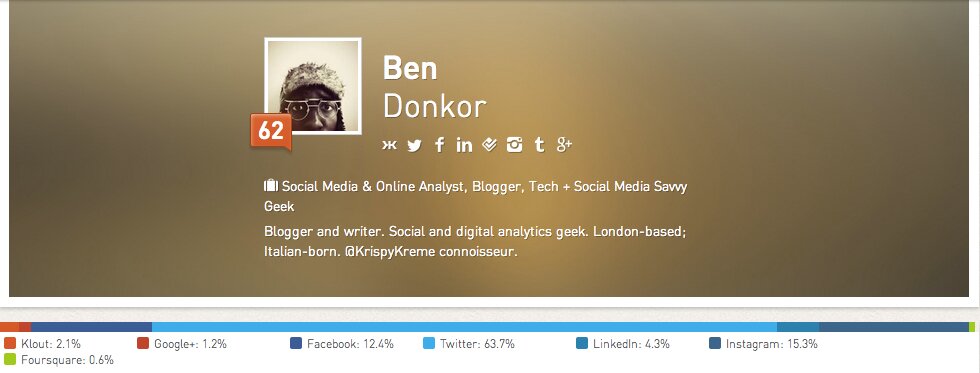
Social influence – much coveted, much debated about, but it seems like no one is 100% sure how to accurately measure it.
While the most known tool to measure social influence is Klout, due to its longevity (and criticism), it’s not the only player in this field:
- there are a few major competitors, such as Kred and London-based PeerIndex;
- there are platform-specific variants, such as EdgeRank Checker for Facebook and Commun.it for Twitter;
- lastly, you’ll also find that a few social analytics tools will have their own influence score based on their own algorithm (e.g. Synthesio‘s very own Influence Score).
Most people working in the digital field have their own opinions on social influence and its accuracy given the current tools available in the industry nowadays. However, it’s undeniable that social influence is still a metric that is very much sought after – whether it’s by PR to see which bloggers to get as sponsors, or by the Social Media team to see who’s driving conversations to (and away from) their social profiles.
I noticed something odd (but unsurprising) a few days ago – every year I follow Forbes’ “30 Under 30“, a shortlist of the most influential young disruptors, innovators and entrepreneurs around the world in various sectors (marketing, technology etc.).
Every year I follow the 30 Under 30 List from , aspiring to be on it someday. Well, here’s the latest one:
— Ben Donkor ()
Interestingly, a large number of these massive influencers either do not have a Twitter account, or just aren’t that active on Twitter. Now, I’m aware that, as of the past few months, my Klout score has been steady between 60 and 62.

I picked a few influencers at random from that list, and I noticed that, according to Klout, I’m more influential than the following 3 people:
-
Douglas Weston (), cofounder of WestonExpressions.

-
Pranav Yadav (), CEO of Neuro-Insight.

-
John Zimmer (), cofounder of Lyft.

And, according to Klout, I’m nearly as influential as the following 3 people:
-
Matt Singley (), CEO at Single Mackie.

-
Bruce Daisley (), Managing Director at Twitter UK.

-
Tony Wang (), VP at Twitter.

Now, while that sounds very flattering, it is completely wrong. This is because somehow the people I’ve listed don’t play by Klout’s rules. The first 3 people I listed don’t tweet very often, while the last 2 people I mentioned do not have an active Klout account. The only person out of the 6 I’ve mentioned who has a Klout account and has multiple accounts linked to it is Matt Singley.

However, even though he’s only one Klout point ahead of me, I personally don’t see myself as influential as he is.
So, how come the scores seem so skewed? It’s because of the following 3 factors that have a major impact on any influence score, regardless of platform:
-
Gamified Influence: the more social networks you link to your Klout account, the more Klout increases your score. This means you can easily gamify your score.
- As a consequence, most people who do not have a Klout account have a generally low-to-medium Klout score (generally around 30, although this varies).
-
Other Social: Klout doesn’t count your influence from social networks and other sources it doesn’t support.
- So, if you’re an influential photographer and your main domain revolves around Flickr and 500px, Klout won’t see it.
- Klout supports Bing, which means that if you own pages and articles and they’re tagged by Bing, Klout will recognise that. However, if an article you’ve written gets a lot of comments or shares on social networks, Klout won’t count it towards your influence score.
-
Offline: offline influence is different from your online influence; some people are influential with what they do outside of social networks (e.g. the people I listed earlier), sometimes more than they portray on social media.
- To tackle this, Klout has added Wikipedia support, if you have a Wikipedia page, you can claim it on Klout, and that will count massively towards your score. However, not everyone who’s influential has a Wikipedia page.
Does this mean that Klout is flawed? Yes and no.
More Than One Influence
Despite popular opinion, Klout is a very clever tool – using complex algorithms to derive how your social networks tie in together and how your content ripples across your networks and beyond, it’s definitely come a long way since its humble beginnings when it used to fit people within quadrants (remember that?).

While accurately measuring influence is a very ambitious piece of work, Klout seems to be a bit too overly ambitious when it refers to itself as “the standard for influence“. The reality is, Klout is purely a measure of mainstream online and social influence.
For example, as of today (January 15), my Klout score is 61, and it’s made up of the following:

As you can see, I’ve linked my Klout account with most of the accounts that it supports. , , LinkedIn, Instagram etc., these are all mainstream social networks, and Klout does a pretty good job at quantifying my influence on those platforms. However, Klout doesn’t see that I’m on Pinterest too, as well as App.net, Flickr, Vine, Reddit, Quora, Path, and many, many other social platforms (and of course the latest addition, Jelly). Most importantly, I do contribute to a few blogs and, of course, I regularly write on this blog too. Klout doesn’t see any of that. Hence, when it comes to mainstream social networks, my influence score is 61%; however, that is only a fragment of my online influence (which may be higher or lower, depending on how you look at it).
Lastly, there’s offline influence too – there’s no tool out there that can count my offline influence when I get invited to speak at events, or when I’m writing my paper on automated sentiment analysis. There’s no tool out there that can quantify what you do offline – purely because it’s offline.
How to tie all of these influences together can become quite complex, especially when you look at the implications behind each one of them. Ultimately this brings us to two questions: can you really measure social influence with a score? If so, how accurately can you quantify your social influence?
That will be another discussion that deserves an article of its own.
Pingback: How I Run my Weekly Social Health Checks - brnrd.me()
Pingback: How To Run A Weekly Social Health Check | Simply Measured()
Pingback: A Kickstart Guide to Employee Advocacy()
Pingback: Employee advocacy: qué es y 5 consejos clave | Criteria()
Pingback: A Kickstart Guide to Employee Advocacy on Social Media - EAI - Employee Advocacy Institute()
Pingback: A Guide to Finding the Best Influencers()